How “hurt” can you be?
After being disallowed from shooting in India, the filming of Salman Rushdie´s Midnight´s Children has been booted out of Sri Lanka as well. The self-appointed Prevention of Vice and Maintenance of Virtue Squad of Sri Lankan Muslims ruled that Midnight´s Children was not to be filmed in the country and President Chandrika Kumaratunga´s characteristically indecisive government acquisced. The permission that had already been granted the BBC for filming was revoked.
This ban is the latest in a series of such refusals that have afflicted Sri Lanka of late. Stanley J. Tambiah´s Buddhism Betrayed? was banned in 1997 because a group of Buddhist ethno-cultural vigilantes decided that it hurt their feelings. Earlier, proscriptions were placed on Satanic Verses and Lajja because they apparently "hurt" the feelings of the Muslim community. A few years ago, the University of Colombo banned the screening of the Indian film Bombay because some Muslim students complained to the authorities that it would hurt their feelings. This, despite the fact that in neighbouring India, with its large Muslim minority, the film had already become a box-office success.

